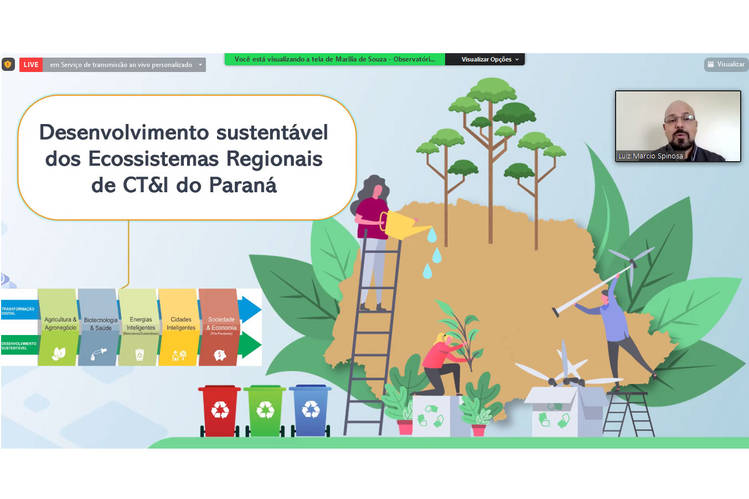The first cycle of the building process for the Strategic Pathways for Science, Technology and Innovation 2040 was completed this week. There were four days of the event, which ended on Thursday (24th), with daily participation of about 150 people, including representatives of state government, academia, the productive sector and civil society.
Building strategic roads is a directive of Governor Carlos Massa Ratinho Jr., and according to the president of the Araucaria Foundation, Ramiro Wahraftej, it will direct the work so that the entire structure of science, technology and innovation (CT&I) institutions is better used.
At the meetings, joint activities were developed to promote transformative actions in the West, North, Coast and Curitiba Capital Region (RMC).
The initiative is the result of a partnership between the state government, through the Araucaria Foundation and the Public Authority for Control of Science, Technology and Higher Education, and the Paraná State Federation of Industries, and is managed by the Sistema Viebe observatory.
Chief of Staff, Goto Silva, emphasized that the main issue for ecosystems is anthropocentrism and that the project should promote dialogue among the members of the quadruple helix, as well as identify where government actions can benefit.
“Parana has great assets that need to be more connected. This project comes to create strategic pathways to solve this problem and solidify what the state already has. Through this work, we will be able to give greater visibility to our assets,” Silva said.
“We have a strong and efficient system of institutions that can further contribute to the creation of wealth and the generation of high value-added income for all people of Paraná,” added the President of Casa Civil.
Adjust For the Superintendent of Science, Technology and Higher Education, Aldo Bona, the action will enable more decisive action. “It is necessary to highlight the importance of these discussions for planning actions to organize technological assets, to harmonize them with technology needs. The active participation of society represented by all the segments that make up the different innovation ecosystems can actually lead us to take more assertive action,” he said.
The success of the project is directly linked to the involvement and participation of assets from all regions of the state, according to Sistema Viebe’s president, Carlos Walter Martins Pedro. “We are starting Paraná’s transformation through CT&I, but I remember 2040 being a symbolic horizon, because the beginning is now,” he said. “We have had procedures similar to this one in the past, but it has never blossomed with due importance. This initiative is innovative, and an important legacy will be left from Paraná”.
According to Fundação Araucária’s Director of Science, Technology and Innovation, Luis Marcio Spinoza, the CT&I Strategic Roads Project puts science and technology into meeting the demands of sustainable development. “It is a valuable material that can contribute to Paraná becoming an increasingly modern and innovative country. It is a joint work of planning that demonstrates how we can bring the ST&I system closer to the economic sector and to generating wealth and quality of life for the population,” he explained.
pillars – The project is built on two pillars: Collective Intelligence, with the participation of various stakeholders from Parana; and smart specialization, striving to generate new regional specializations by discovering areas of opportunity.
“This week we closed the first block of four ecosystems. Then we will work on five more. The steps underway at this moment are essential to ensure the participation of local actors, in order to obtain the necessary collective information,” explained the Executive Director of Observatório Sistema Fiep Marília de Souza.
The deputy mayor of Curitiba, Eduardo Pimentel, highlighted the complementarity of the measures. “The work of the city council is completely in line with the actions of the state government. The main goal is to integrate and to look for partners, since Curitiba is a large consumer market and we can help other municipalities, without having to go to other states to meet their demands. All this generates more profits for the regions and strengthens all fields. He stressed that community integration is one of the principles of smart cities.”
contributions – All CT&I 2040 Strategic Track Boards can be checked again on Channel Araucaria Foundation on YouTube. Until July 16, it is possible to contribute to this collective building through the link https://observatorios.fiepr.org.br/obsurvey/rotascti2040.

“Wannabe internet buff. Future teen idol. Hardcore zombie guru. Gamer. Avid creator. Entrepreneur. Bacon ninja.”

